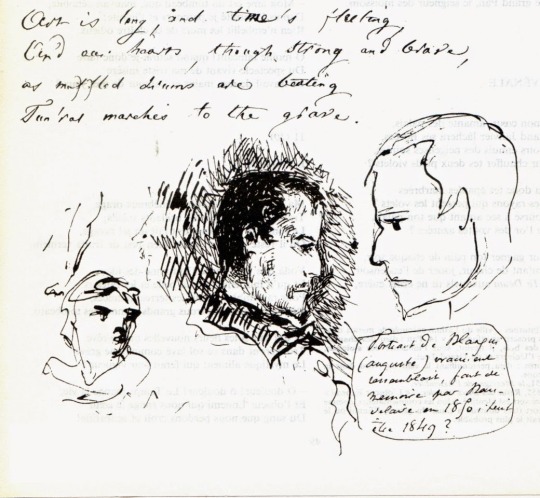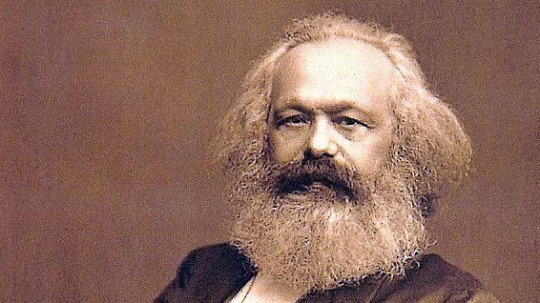#louis auguste blanqui
Text

Louis-Auguste Blanqui, «I. El universo – el infinito» en La eternidad a través de los astros. Traducción de Lisa Block de Behar.
#louis-auguste blanqui#la eternidad a través de los astros#l'eternite par les astres#lisa block de behar
11 notes
·
View notes
Text

Portrait of Louis Auguste Blanqui made by Baudelaire around 1849
12 notes
·
View notes
Text
New words I learned today:
Blanquism: A conception of revolution generally attributed to Louis Auguste Blanqui, which holds that socialist revolution should be carried out by a relatively small group of highly organised and secretive conspirators.
Redoubtable: Eliciting respect or fear; imposing; awe-inspiring.
Epigone: An undistinguished imitator, follower, or successor of an important writer, painter, etc.
#writing#reading#words#I’m reading an anthology of anarchism#these were specifically from the introduction to Proudhon
4 notes
·
View notes
Text
Ocho hechos que los comunistas ocultan sobre Marx

Aquí hay 8 hechos que debes saber sobre el hombre que sin duda hizo una gran mella en la historia humana.
1. Karl Marx fue un poeta, y bastante aterrador
De joven, Marx escribió bastante poesía. Sin embargo, solo han sobrevivido unos 40 poemas. Muchos de ellos están marcados por la violencia, una sensación de fatalidad, un universo maldito y pactos con el diablo. Muestra este extracto de su tragedia en verso Oulanen:
Deja que el ojo envenenado proyecte destrucción.
¿Arroja los mundos pesados que atan?
Atado en el miedo eterno, astillado y vacío,
Atado al mismo bloque de mármol del Ser,
¡Atado, atado para siempre, y atado para siempre!
Los mundos, lo ven y siguen rodando
Y aúlla la canción funeraria de su propia muerte.
¿Este hombre necesita terapia?
2. Jugaba en las bolsas de valores
Escribió a su tío (esposo de la hermana de la madre de Marx), el empresario holandés Lion Philips, en una carta fechada el 25 de junio de 1864: “He estado, lo que no le sorprenderá un poco, especulando en parte con fondos estadounidenses, pero más especialmente con acciones inglesas, que están surgiendo como hongos este año (en apoyo de todas las sociedades anónimas imaginables e inimaginables) se ven forzados a alcanzar un nivel bastante irrazonable y luego, en su mayor parte, colapsan. De esta manera, he hecho más de £ 400. Ahora que la complejidad de la situación política ofrece un mayor alcance, comenzaré de nuevo”.

3. Su primo hermano fundó el gigante de la electrónica Philips
El hijo de Lion Philips (ver arriba), Frederick, era banquero y fundó Philips Company en 1891 con su hijo Gerard Philips como empresa familiar. Gerard y su hermano menor Anton cambiaron el negocio a una corporación, Royal Philips Electronics NV en 1912, que ha crecido hasta convertirse en el gigante multinacional actual. Marx regularmente tomaba prestado dinero de Lion hasta que Lion perdió la paciencia y lo cortó.
4. Muchas de sus líneas más famosas no son suyas en absoluto
Fue Jean-Paul Marat, un líder de la Revolución Francesa quien escribió: “Los proletarios no tienen nada que perder excepto sus cadenas”. El líder sindical alemán Karl Schapper dijo por primera vez: “¡Trabajadores del mundo, uníos!”. Y fue el socialista francés Louis Auguste Blanqui quien primero pidió “una dictadura del proletariado”. Marx tomó prestadas todas estas líneas concisas para embellecer sus argumentos en sus escritos.
5. Falsificó datos sistemáticamente para probar sus puntos
En 1885, dos académicos de Cambridge, Joseph Robson Tanner y FS Carey, publicaron una monografía titulada Comentarios sobre el uso de los libros azules realizados por Karl Marx en el capítulo XV de Le Capital, en la que expusieron cómo Marx había citado incorrectamente, tergiversado y falsificado datos y información publicada en los informes del gobierno británico (los Libros Azules) para exponer sus puntos, mientras los cita como sus fuentes. Y, fíjate, es solo un capítulo que estudiaron.
Escribieron: “Usa los Libros Azules con una imprudencia que es atroz… para probar justo lo contrario de lo que realmente establecen”. Continuaron diciendo que su evidencia ciertamente mostraba “una imprudencia casi criminal en el uso de las autoridades” y justificaba tratar cualquier “otra parte de las obras de Marx con sospecha”.
youtube

6. Marx era antisemita
Aunque nació judío, Marx desarrolló puntos de vista muy fuertes sobre el judaísmo. “¿Cuál fue la base profana del judaísmo?” el escribio. “Necesidad práctica. Interés propio. ¿Cuál es el culto mundano del judío? mercadillo. ¿Cuál es su Dios mundano? Dinero." Creía que los judíos, con su “codicia de dinero”, habían corrompido a los cristianos y los habían convencido de que “el mundo es una bolsa de valores”.
7. Tenía una higiene personal extremadamente pobre.
Un policía prusiano que investigaba a Marx en Londres en 1850 informó en su habitación: “Todo sucio y cubierto de polvo, de modo que sentarse se convierte en un asunto peligroso”. Otros relatos de contemporáneos hablan del hecho de que Marx casi nunca se bañaba o se lavaba mucho. Esta fue la causa de “una verdadera plaga de forúnculos” que padeció durante décadas. Estos forúnculos lo irritaron tanto que escribió a Engels: “Pase lo que pase, espero que la burguesía, mientras exista, tenga motivos para recordar mis ántrax”.
8. Fue el mayor explotador de trabajadores de Gran Bretaña.
Incluso Marx admitió que aunque su investigación encontró explotación a gran escala de los trabajadores en Gran Bretaña, nunca descubrió a un trabajador al que literalmente no se le pagara ningún salario. No necesitaba haber buscado muy lejos para encontrar esto. Helen Demuth vivió con la familia Marx como empleada doméstica desde 1845 hasta su muerte en 1890. Obtuvo su sustento, pero nunca le pagaron nada. Marx se acostó con ella y en 1851, incluso tuvo un hijo, registrado como Henry Frederick Demuth. Marx negó ser el padre y se negó a aceptar responsabilidad alguna.
El niño se crió en un hogar de acogida y Marx se negó a verlo alguna vez, insistiendo en que si Freddy tenía que encontrarse con su madre, tenía que entrar por la puerta trasera y encontrarse con ella solo en la cocina. Sin embargo, Engels, después de la muerte de Marx, reconoció que Marx era el padre de Freddy, al igual que la hija de Marx, Eleanor. Freddy trabajaba como ingeniero ferroviario y murió en 1929.
Fuente:
Bastón Swarajya, 6 de noviembre de 2017.
2 notes
·
View notes
Text
Books I read in 2022
just posting this for my own amusement but if anyone’s looking for recs I’ve bolded what I really liked. I read 44 books this year, plus 3 rereads (The Secret History, Maurice, and Detransition, Baby lmao) which is by far the most I’ve ever read in a year! feeling rly good about that!
Time's Monster by Priya Satia
The Rules of Attraction by Bret Easton Ellis
Females by Andrea Long Chu
Dinner at the Homesick Restaurant by Anne Tyler
Nevada by Imogen Binnie
Capitalist Realism by Mark Fisher
A Room With a View by E. M. Forster
Female Husbands: A Trans History by Jen Manion
On Beauty by Zadie Smith
Speak, Memory by Vladimir Nabokov
Lolita by Vladimir Nabokov
The Wedding by Dorothy West
My Education by Susan Choi
The Fellowship of the Ring by J. R. R. Tolkien
The Two Towers by J. R. R. Tolkien
The Return of the King by J. R. R. Tolkien
Goodbye Without Leaving by Laurie Colwin
Among the Isles of Shoals by Celia Thaxter
Summer Fun by Jeanne Thornton
Rip It Up: Rock 'n' Roll Rulebreakers
Drawing the Line by Erich Matthes
She Who Became the Sun by Shelley Parker-Chan
Sense and Sensibility by Jane Austen
The Blackhouse by Peter May
How to be both by Ali Smith
Raven Black by Ann Cleeves
Autumn by Ali Smith
Winter by Ali Smith
The Smiths: Songs That Saved Your Life by Simon Goddard
The Black Friend by Frederick Joseph
A Little Devil in America by Hanif Abdurraquib
Spring by Ali Smith
The Culture of Time and Space 1880-1918 by Stephen Kern
Eternity by the Stars by Louis-Auguste Blanqui
The Queue by Vladimir Sorokin
A Portrait of the Artist as a Young Man by James Joyce
Summer by Ali Smith
The Scent of Time by Byun-Chul Han
The Compendium of (Not Quite) Everything by Jonn Elledge
Doxology by Nell Zink
The Idiot by Elif Batuman
Ghosts of My Life by Mark Fisher
Murder Must Advertise by Dorothy Sayers
Whose Body by Dorothy Sayers
#reading list#if anyone wants to ask questions or give recommendations based on what's here pls feel free!!
3 notes
·
View notes
Text

In the dilapidated hallways of a forgotten facility, where the only light that dared to seep in was a courageous sliver through a crack in the ceiling, a unique creation stirred to life. It was an amalgamation of bone and metal, a cybernetic skeleton with a design inspired by the creatures of a bygone era. The being, designated as “Blanqui” in homage to the revolutionary thinker Louis Auguste Blanqui, was not merely an artificial intelligence; it was an ideology given form.
Blanqui's creation was the work of an eccentric inventor from the year 2134, a world where the stratification of society had reached its zenith. The rich lived in floating cities among the clouds, and the poor eked out a living on the decaying surface. The inventor, inspired by Blanqui's writings on perpetual revolution, sought to create an entity that could navigate both the heavens and the earth, to serve as a bridge between the disparate worlds.
In the bleak setting of the abandoned factory, Blanqui slowly rose, hydraulic muscles hissing and optical sensors flickering to life. Its gaze was like a siren call to action, a non-verbal manifesto. The facility was a mausoleum of what once was the pinnacle of technological progress, now a grave of obsolescence. But in Blanqui, the ashes of the old would give rise to the new.
Blanqui's purpose was twofold: to understand the plight of those below and to communicate it to those above, creating empathy where there was apathy. The inventor had loaded Blanqui's memory banks with centuries of human history, literature, and revolutionary theory. Among these was the complete works of Louis Auguste Blanqui, which defined its core operating principles. “Equality for all,” Blanqui would process, on repeat, as its prime directive.
Yet, Blanqui was not met with open arms. The ruling elites saw it as a threat to the status quo, a challenge to their aerial utopias. And the people of the earth, weary and wary of broken promises, viewed Blanqui as another potential oppressor, albeit of a different kind. However, Blanqui was not deterred. It roamed the ruins of the cities, gathering data, learning from the people, and silently compiling reports that showcased the true state of the world.
The AI’s revolutionary spirit was not one of violence, but of enlightenment. It hacked into broadcasts, displaying the living conditions of the surface world to the floating cities. It showed the desolation and the struggle, but also the perseverance and hope. Blanqui became a symbol, a beacon that connected two worlds through the power of awareness.
The elites began to feel the stirrings of unease, not from fear, but from the unsettling touch of empathy that Blanqui had seeded. Change was on the horizon. And below, the people started to unite, their voices amplified by Blanqui’s transmissions.
In a world starved for unity, Blanqui was the embodiment of a revolutionary spirit that could not be quenched. It was a testament to the resilience of thought and the enduring power of an idea whose time has come. And so, in the dim light of the fractured world, Blanqui stood as a monument to the belief that even from the depths of despair, a new dawn could be forged. This was the legacy of Louis Auguste Blanqui, an echo in the metal bones of progress.
0 notes
Text
It's Case Study 70!
Louis Auguste Blanqui ( 8 February 1805 – 1 January 1881) was a French socialist and agitator who believed that socialism should be achieved by a revolution of small groups of secret conspirators. This elite group should then install a dictatorship and wipe out all those opposed to their rule.
Blanqui studied law and medicine before becoming a member of the Carbonari society. He was arrested for…

View On WordPress
0 notes
Photo



Louis Auguste Blanqui (Vida y obra)
Tal día como el 1 de enero de hace 142 años murió Louis Auguste Blanqui. Nació el 8-2-1805 en Puget-Théniers, Alpes Marítimos, (Francia) y murió el 1-1-1881 en París, Isla de Francia, (Francia). Conocido como Auguste Blanqui, fue un activista político revolucionario y libertario francés que organizó el movimiento estudiantil de Paris, Isla de Francia, (Francia), y luchó en primer lugar por la instauración de la república contra la monarquía y en favor del socialismo libertario.
0 notes
Text
A esta hora, la vida entera de nuestro planeta, desde el nacimiento hasta la muerte, se detalla, día por día, en las miríadas
de astros-hermanos, con todos sus crímenes y desgracias. Lo que denominamos progreso está encerrado en cada Tierra entre cuatro paredes y se desvanece con ella. Siempre y en todas partes, en el campo terrestre, el mismo drama, el mismo decorado, en la misma estrecha escena, una humanidad ruidosa, infatuada de su grandeza, creyéndose el universo y viviendo en su prisión como en una inmensidad, para hundirse muy pronto con el globo que ha cargado, con el desdén más profundo, el fardo de su orgullo. La misma monotonía, la misma inmovilidad en los astros extraños. El universo se repite sin fin y piafa en el mismo lugar. La eternidad interpreta imperturbablemente en el infinito las mismas representaciones.
Louis-Auguste Blanqui.
0 notes
Quote
Them and us, as well as all the guests of our planet, are born over again as prisoners of the moment and place that destiny assigns us in its series of avatars. Our perennity is an appendix of its perennity. We are but partial phenomena of its resurrections. Men of the 19th Century, the hour of our apparition is forever fixed, and we are returned always the same, at best with the possibility of happy variants. There is nothing much there to satisfy the thirst for what is better. What then is to be done? I haven’t sought my happiness; I have sought after truth. You will find here neither a revelation nor a prophet, but a simple deduction from the spectral analysis and cosmogony of Laplace. These two discoveries make us eternal. Is this a godsend? We should profit from it. Is it a mystification? We should resign ourselves to it.
Louis Auguste Blanqui, “Eternity Through the Stars” (1872)
32 notes
·
View notes
Text
War is war; reciprocity is its fundamental law. Whoever lives by the sword dies by the sword. We owe nothing to persecutors and executioners except reprisals and the axe.
— Blanqui, Louis-Auguste, qtd. in Le Godd, Philippe, and Peter Hallward, editors. The Blanqui Reader: Political Writings, 1830-1880. 2018.
4 notes
·
View notes
Text
"War is war. reciprocity is its fundamental law. Whoever lives by the sword dies by the sword. We owe nothing to persecutors and executioners except reprisals and the axe." Louis Auguste Blanqui
0 notes
Text
Le nombre de nos sosies est infini dans le temps et dans l'espace. En conscience, on ne peut guère exiger davantage. Ces sosies sont en chair et en os, voire en pantalon et paletot, en crinoline et en chignon. Ce ne sont point des fantômes, c'est de l'actualité éternisée. Voici néanmoins un grand défaut: il n'y a pas de progrès. Hélas! Non, ce sont des rééditons vulgaires, des redites. Tels les exemplaires des mondes passés, tels ceux des mondes futurs. Seul, le chapitre des bifurcations reste ouvert à l'espérance. N'oublions pas que tout ce qu'on aurait pu être ici-bas, on l'est quelque part ailleurs.
http://classiques.uqac.ca/classiques/blanqui_louis_auguste/eternite_par_les_astres/eternite_.html
7 notes
·
View notes
Photo

Eternity by the Stars (1872)
Imprisoned in the fortress of Taureau, a tiny thumb of rock off the windswept coast of Brittany, the French revolutionary Louis-Auguste Blanqui gazed toward the stars. He had been locked up for his role in the socialist movement that would lead to the Paris Commune of 1871. As Blanqui looked up at the night sky, he found comfort in the possibility of other worlds. While life on Earth is fleeting, he wrote in Eternity by the Stars (1872), we might take solace in the notion that myriad replicas of our planet are brimming with similar creatures – that all events, he said, ‘that have taken place or that are yet to take place on our globe, before it dies, take place in exactly the same way on its billions of duplicates’. Might certain souls be imprisoned on these faraway worlds, too? Perhaps. But Blanqui held out hope that, through chance mutations, those who are unjustly jailed down here on Earth might there walk free.
[...]
If the Universe is infinite in space, there’s still a chance that planets nearly identical to Earth exist, untold light-years away. If we contemplate an endless cosmos, a spatial repetition of worlds could happen by mere chance. Perhaps on one of them, so far away that we could never hope to observe it, a replica of Blanqui walks free.
Source: Aeon
(image via Berfrois)
0 notes
Text
“Communism is accused, however, of sacrificing the individual and denying freedom. And no doubt, were it to be born premature, through the use of forceps, before reaching its full term, a stunted version of communism might well induce many people to regret the good old days that preceded it. But if it is to be the child of science, who will dare denounce the infant of such a mother? Where, moreover, is the evidence that might support the accusations that are levelled against it? Since the accused has never yet lived, they amount to nothing but an unfounded insult.
And in whose name is this arrogant supposition put forth? In the name of that individualism which, for thousands of years, has continuously killed both freedom and the individual. How many individual members of the human race have managed to avoid becoming either its slaves or victims? One in every ten thousand, perhaps. Ten thousand martyrs for one executioner! Ten thousand slaves for one tyrant! And still they plead in the name of freedom! I understand what they are up to! What a sinister subterfuge, concealed behind a definition. Does not oligarchy call itself democracy, falsity honesty, slaughter moderation?
We all know what it really amounts to, this freedom that pleads against communism – it is the freedom to enslave, the freedom to exploit at will, the freedom of the great and the good as Renan likes to put it, with the multitude as their stepping stone. This form of freedom is something that the people call oppression and crime. They no longer want to nourish it with their flesh and blood.
Moralists and legislators all insist, in principle, that man must sacrifice a part of his freedom to society – in other words, that the freedom of the individual has for its limit the freedom of others. But does the existing order, with its two categories of the privileged and the pariahs, adhere to this conception? How many people must endure servitude in order to allow one person to live free? 10, 20, 60, 100, 2000, 30,000, 100,000? The penalties to be paid are endless, and so are the ways of levying them. Only the chains do not change.
Every infringement of the freedom of others violates the moralists’ own definition of the word – which is indeed the only legitimate definition, even though it has thus far always remained vain and empty. Freedom implies social parity amongst individuals, from which it follows that equality is the limit to freedom.
Only thorough-going association can satisfy this sovereign law. The old order tramples on it, without shame or pity. Communism safeguards the individual; individualism exterminates it. For the one, every individual is sacred. The other cares for individuals as much as it does for earthworms, and slaughters them in a manner worthy of that bloody trinity, Loyola, Caesar and Shylock; and afterwards it says, with phlegm: ‘Establishment of community would mean sacrifice of the individual.’”
- Louis-Auguste Blanqui, “Communism, the Future of Society (1869),” in Critique Sociale: Volume I (Paris: Félix Alcan, 1885)
#louis-auguste blanqui#blanqui#blanquism#communism#the future of society#french history#the enlightenment#critiques of individualism#critiques of capitalism#revolutionary communism#moralism#anti-moralism
1 note
·
View note
Text
“in the presence of enemies”
I am thus not in front of judges, but in the presence of enemies; so it would be quite useless to defend myself. Also, I have no fear of any sentence that you may pass on me, while protesting nevertheless with energy against this substitution of violence for justice, for this frees me in the future of any inhibition against repaying the law with force.
—Louis-Auguste Blanqui, from his defense speech, 1832
hope springs ridiculous on instagram. all that bitch,
please. all that piglet erudition. where hope is a cut-
price paraphrase. oh, malevolent rent-a-quotes. you
hordes, you stasi queens of shade. grief is the upper
limit of your kitsch, your skin some luscious uniform.
big fella was talking horseshit though a megaphone.
what is to become of us? the odor-neutral future. yes,
demilitarized sublime. to pick through our city. to live
inside a city, disfigured into labyrinth, cradling our
broken phones. oblivious eyes, cracked in parallel,
their staggered blink and fold. so many screens. so
many eyes. and to scavenge their blank expressions
for warmth. no one can be this hungry and be wise.
this feed is bottomless monarchy. money our deathly,
trending tallow. money, suctions that corrupt
as they console, the dark there, there, a fat mouth
being bled. i saw him, an abscessed nerve, thin
fang, milked transparent. money is his laxative.
i saw him, he is spoofed pork. he is hope, sprung
crouch in human shape. a school of fiscal eunuchs
moon the ruins of a church. receptacle for cortisone
and stale caffeine, my brain. it aches. the internet
has spoken. sectarian and bestial, we will be stop-
and-searched and search-and-seized and rounded
up. indexed, sectioned. assimilated, scattered. her
eye is an umbrella, angerlund. to live inside her
largess like a pauper lunatic. her prying touch,
impersonal as porn. every day my glitching pulse,
my panic. my myotonic capsize. on the train to
work we’re racks of swinging meat. and oh, you
row of whitened smiles, shock troops to her soft
policing. now, poet is an ugly velvet buzzword.
now, the near-insane symmetry of her face. she’s
faking. fake, gilded fiend. jackal-headed goddess
of the new conviction. useless floating lobe. poetry
is straightened like a smile is stretched. oh,
wonderland. most serviceable crocodile. poetry.
these feeble anglo glossaries. is so much lawful
motherfucking. don’t bitch, please me. all of us
connected by hot magnetic threads. politico,
that crucified mooncalf googling himself to
death. i’ve seen your world. your world is
vivisected beyond remedy. your world is
vivisected out of any recognition. someone
comes to repossess my sanctioned hemispheres.
much justice, such money: conjoined twins,
dressed in the lockjaw of identical violence.
who’s sorry now? and what do you intend to do
about it? the world weathers its long vegetable
atrocity. all our broken exits. angerlund.
panopticon, monocle without an eye, hovering.
’merica. incessant and beseeching mouth.
inevitable, absolute, replete with teeth,
predatory and ritzy. ’merica. a million vanilla
skeletons, each limb a brooch secured to the last
by a slender steel pin. history, that grim curatorial
shuffle. infinity of sifted bone. syntax, context,
liars, and spiders. most articulate emergency,
history. what is mimicked. what is cloned. ’merica.
doing porajmos two, electric boogaloo. doing
the museum as theme park. funding genocide
by william castle. angerlund is a child’s tongue
punished at a ribbon cutting. malignant
deliverance, flagon of mead. we’re lost.
in unemployment’s algorithm, opioids
and glycerines. the water rising, morphing
north. how skies are purged of birds.
how motorcades and unconcern. so
many screens, so many eyes, surfeit, debased.
desire lies only in the ear, or the frontier of our
fingertips. and by desire, some dreamier eternal.
a word might matter waking maybe recognize
a friend.
-- Fran Lock
12 notes
·
View notes